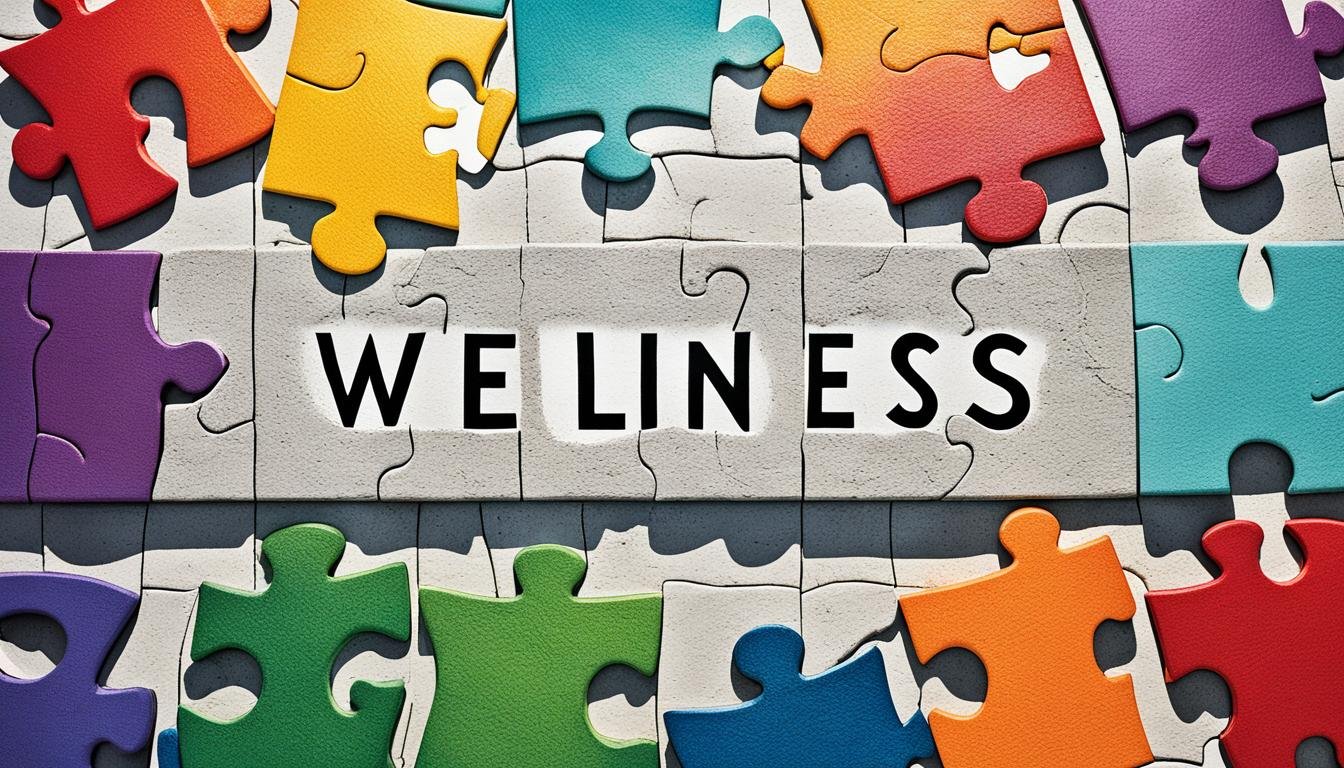What are the 12 Dimensions of Wellness?
The concept of wellness goes beyond physical health and encompasses various dimensions that contribute to overall well-being. These dimensions, collectively known as the 12 Dimensions of Wellness, form the foundation for achieving holistic well-being and complete health.
Each dimension represents a unique aspect of our lives, interconnected and impactful in shaping our well-being experience. From self-responsibility and self-love to finding meaning and transcending, these dimensions provide a comprehensive framework for achieving optimal wellness in all areas of life.
Understanding and nurturing each dimension of wellness is vital for achieving a balanced and fulfilling life. By addressing these dimensions, you can enhance your overall happiness, improve your relationships, and experience a greater sense of purpose and fulfillment.
Key Takeaways:
- The 12 Dimensions of Wellness encompass various aspects of our lives and contribute to overall well-being.
- Self-responsibility and self-love are crucial for personal well-being.
- Mindful breathing promotes relaxation and increases sensory awareness.
- A well-balanced, healthy diet is essential for physical and mental well-being.
- Addressing all dimensions of wellness is important for achieving complete health and holistic well-being.
Self-Responsibility and Self-Love
In order to experience holistic well-being, it is important to cultivate self-responsibility and self-love. Self-responsibility involves taking control of our thoughts, emotions, and actions, and acknowledging that we have the power to shape our own lives. By prioritizing our own needs and ensuring self-care, we can create a solid foundation for our overall well-being.
Self-love goes hand in hand with self-responsibility, emphasizing the importance of showing compassion, acceptance, and care towards ourselves. It is about recognizing our own worth and treating ourselves with kindness and respect. When we practice self-love, we not only enhance our own well-being, but also improve our relationships with others, as we are able to approach them from a place of authenticity and love.
By taking self-responsibility and cultivating self-love, we are able to navigate life’s challenges with grace and resilience. We become more attuned to our own needs and are better equipped to make choices that align with our values and promote our well-being. These practices empower us to live a life that is true to ourselves and fosters a sense of fulfillment and contentment.
Key Takeaways:
- Self-responsibility involves taking control of our thoughts, emotions, and actions.
- Self-love is the practice of showing compassion, acceptance, and care towards oneself.
- Both self-responsibility and self-love are crucial aspects of personal well-being.
- They form the foundations for how we treat ourselves and others.
“Self-responsibility is the key to unlocking your full potential and living a life of fulfillment.” – Tony Robbins
Breathing
Breathing is an essential aspect of our daily lives, yet it is often taken for granted. Mindful breathing is a practice that can greatly enhance our well-being. By focusing on the breath and experiencing its natural rhythm of inhaling and exhaling, we can cultivate a sense of relaxation, reduce stress, and increase our sensory awareness.
Mindful breathing allows us to become fully present in the moment, bringing our attention away from distractions and into our bodies. As we inhale deeply, we can feel the air filling our lungs, delivering fresh oxygen to our cells. And as we exhale, we can release tension, letting go of any thoughts or worries that may be weighing us down.
The Benefits of Mindful Breathing
- Relaxation: Mindful breathing activates the body’s relaxation response, calming the nervous system and promoting a state of tranquility and calmness.
- Stress Reduction: By focusing on our breath, we can redirect our attention away from stressful thoughts and emotions, helping to alleviate anxiety and tension.
- Sensory Awareness: Mindful breathing increases our sensory awareness, allowing us to fully experience the present moment and engage more deeply with our surroundings.
“The present moment is the only time over which we have dominion.” – Thich Nhat Hanh
Mindful breathing is a powerful tool that can be practiced anytime, anywhere. Whether you’re sitting at your desk, taking a walk in nature, or lying in bed before sleep, you can always return to your breath and find a sense of calm and grounding.

Take a moment right now to experience the power of mindful breathing. Close your eyes, take a deep breath in through your nose, and slowly exhale through your mouth. Notice how your body feels as you breathe in and out. Allow yourself to fully embrace the present moment and let go of any distractions or worries. As you continue to practice mindful breathing, you will cultivate greater relaxation, well-being, and a deeper connection to yourself and the world around you.
Eating
Eating plays a significant role in overall well-being. A well-balanced, healthy diet provides the energy and nutrients necessary for a healthy mind and body. It is important to prioritize fresh, whole foods and practice moderation in eating.
Mindful eating, which involves paying attention to the sensory experience of eating, can improve digestion, enhance enjoyment of food, and promote conscious food choices. By slowing down and fully engaging with our meals, we can cultivate a deeper connection with our bodies and the food we consume. Mindful eating allows us to savor each bite, appreciate the flavors, textures, and aromas, and notice how our body responds throughout the eating process.
Benefits of Mindful Eating:
- Increases awareness of hunger and fullness cues, helping to prevent overeating
- Enhances digestion and nutrient absorption
- Reduces mindless snacking and emotional eating
- Promotes healthier food choices and portion control
- Improves satisfaction and enjoyment of meals
- Supports a more positive relationship with food and body image
- Brings a sense of mindfulness and presence to mealtime
Practicing Mindful Eating:
- Pause before eating: Take a moment to assess your hunger levels and set an intention to eat mindfully.
- Engage your senses: Notice the colors, smells, and textures of the food. Take small bites and savor each mouthful.
- Eat without distractions: Turn off the TV, put away your phone, and create a calm environment free from distractions.
- Chew slowly: Take your time to chew each bite thoroughly, allowing the flavors to fully develop.
- Listen to your body: Pay attention to your body’s signals of hunger and fullness. Stop eating when you feel satisfied, but not overly full.
By adopting a mindful eating practice, you can nourish your body and cultivate a deeper connection with the food you consume. Mindful eating is an integral part of a healthy diet and contributes to overall well-being.
Conclusion
Holistic well-being encompasses the 12 dimensions of wellness, interconnecting different aspects of our lives to contribute to our overall health and happiness. To achieve complete health, it is essential to take care of ourselves in each dimension. By practicing self-responsibility and embracing self-love, we prioritize our needs and ensure self-care as the foundation for well-being.
Engaging in mindful breathing allows us to experience relaxation, reduce stress, and increase sensory awareness. It enables us to find a sense of calmness and focus, enhancing our ability to engage in what truly matters to us. Additionally, embracing healthy eating habits and practicing mindful eating promote a well-balanced diet that nourishes both the mind and body.
To improve our well-being and live a fulfilled life, we need to focus on other dimensions as well, including movement, feeling, and thinking. By incorporating regular physical activity into our routines, exploring our emotions, and fostering positive thinking, we can tap into the complete potential of our well-being. It is the synergy between these dimensions that cultivates holistic health and allows us to thrive in every aspect of our lives.
FAQ
What are the 12 Dimensions of Wellness?
The 12 dimensions of wellness are self-responsibility and self-love, breathing, sensing, eating, moving, feeling, thinking, work and play, communicating, intimacy, finding meaning, and transcending.
What is self-responsibility and why is it important for well-being?
Self-responsibility involves taking control of our thoughts, emotions, and actions. It is about prioritizing our own needs and ensuring self-care. Self-responsibility is important for personal well-being as it forms the foundation for how we treat ourselves and others.
What is self-love and how does it contribute to well-being?
Self-love refers to the practice of showing compassion, acceptance, and care towards oneself. It is closely related to self-responsibility and plays a crucial role in personal well-being. By practicing self-love, we can enhance our overall well-being and cultivate a positive self-image.
How does mindful breathing impact well-being?
Mindful breathing involves focusing on the breath and experiencing the natural rhythm of inhaling and exhaling. It promotes relaxation, reduces stress, and increases sensory awareness. Mindful breathing helps individuals achieve a state of calmness and focus, enabling them to better engage in what is important to them.
How does eating affect overall well-being?
Eating plays a significant role in overall well-being. A well-balanced, healthy diet provides the energy and nutrients necessary for a healthy mind and body. It is important to prioritize fresh, whole foods and practice moderation in eating. Mindful eating, which involves paying attention to the sensory experience of eating, can improve digestion, enhance enjoyment of food, and promote conscious food choices.
How do the 12 dimensions of wellness contribute to holistic well-being?
The 12 dimensions of wellness are interconnected and contribute to our overall health and happiness. Taking care of ourselves in each dimension is essential for achieving complete health. By practicing self-responsibility, engaging in mindful breathing, embracing healthy eating habits, and focusing on other dimensions such as movement, feeling, and thinking, we can improve our well-being and live a fulfilled life.






